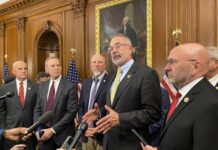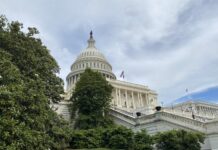
(GA Recorder) — Hospitals are once again pausing non-essential procedures as the number of COVID-19 patients in Georgia medical facilities surpasses January’s highs and as congressional leaders press the governor to do more to ease the strain caused by the surge in cases.
Grady Hospital System in downtown Atlanta became the latest Wednesday to announce it would temporarily halt all non-essential surgeries. Others have made similar announcements in the last few weeks.
“We are working through this as best we can, all while watching closely for a potential post-holiday COVID-19 surge,” John M. Haupert, the system’s CEO said in a community message. “We realize this is a decision that will inconvenience our patients but is necessary under these extraordinary circumstances to keep our patients and staff safe.”
The more easily transmissible delta variant has presented a harrowing challenge as Georgia hospitals swell with large numbers of unvaccinated COVID-19 patients. Hospitals have reported severe overcrowding in their emergency rooms, causing them to divert ambulances, and bed capacity at intensive care units is nearly maxed out.
As of Wednesday, there were more than 6,000 COVID-19 patients hospitalized in Georgia or about 35.7% of all inpatients. Before the recent surge in cases, the previous high point was 5,700 patients – representing 31.6% of patients – back in mid-January, according to the Georgia Hospital Association.
The recent spike in cases prompted Georgia U.S. Reps. Hank Johnson and David Scott, who are both Democrats, to write a letter to Republican Gov. Brian Kemp urging him to order the state Department of Public Health to suspend all elective surgeries and continue to waive licensing rules for in-demand health care workers.
“Hospital systems are being forced to make difficult decisions about how to care for patients when there aren’t enough resources to go around,” the pair wrote in the letter dated Tuesday. “Our state is at a critical point in its fight against the pandemic and as elected officials, we must prioritize the health and well-being of our citizens above all other considerations.”
Kemp quickly fired back a letter to the congressmen Wednesday. He pointed to his recent move to send more state-supported hospital personnel to help with a staffing shortage – growing the total number of these workers from 1,500 to 2,800 at a cost of $625 million through December. That allowed hospitals to tap another 450 beds across the state.
The governor has also activated up to 2,500 Georgia National Guard troops to help with non-medical needs at hospital campuses. That’s in addition to the 105 medically trained Guard troops already deployed to hospitals.
And he defended his decision not to force hospitals to suspend elective surgeries, saying he is listening to hospital leaders and organizations that represent hospitals at the state Capitol.
“First, hospitals are already successfully monitoring and fluctuating the volume of elective procedures themselves, without a government mandate,” Kemp wrote in his response.
“Second, many elective procedures are critical to the short and long-term health of millions of Georgians. And finally, banning elective procedures would bankrupt hospital systems already reeling from a year and a half fighting a global pandemic.”
Kemp suggested two ways the state’s congressional officials can help: Push the federal government to set a maximum rate for contract health care workers so states can stop jockeying to outbid one another using federal relief money and to provide clear guidance on COVID-19 booster shots and how they will be delivered to states.
Anna Adams, senior vice president of external affairs for the Georgia Hospital Association, said many hospitals have already decided to cancel procedures that can wait. But she said it’s also important for people to understand what an elective procedure is.
“I think for a lot of people they think that means nose jobs and knee replacements, but the more conversations we have, we’re trying to make sure people understand these are things like hernia repairs and tumor resections that are still happening. Those are things that impact people’s quality of life.
“And so for those situations, where it is truly in the patient’s best interest, we are continuing to do those surgeries,” she added.







